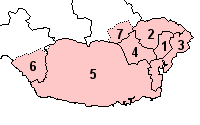List of parliamentary constituencies in South Glamorgan
Until the 2024 general election the preserved county of South Glamorgan was divided into five parliamentary constituencies: four borough constituencies and one county constituency. The boundaries had been effective since the 2007 National Assembly for Wales election and the 2010 United Kingdom general election.[1]
Constituencies
| Name | 1997 to 2010 | From 2010 |
|---|---|---|
|
 |
 |
The Vale of Glamorgan constituency was formed out of the Barry constituency in 1983, with Penarth supplementing abolished Cardiff South to become Cardiff South and Penarth.
Conservative † Labour ‡
| Constituency | Electorate | Majority | Member of Parliament | Nearest opposition | Map reference above | ||
|---|---|---|---|---|---|---|---|
| Cardiff Central BC | 64,037 | 17,179 | Jo Stevens ‡ | Meirion Jenkins † | 1 | ||
| Cardiff North BC | 68,438 | 6,982 | Anna McMorrin ‡ | Mo Ali † | 2 | ||
| Cardiff South and Penarth BC | 78,837 | 12,737 | Stephen Doughty ‡ | Philippa Broom † | 3 | ||
| Cardiff West BC | 68,508 | 10,986 | Kevin Brennan ‡ | Carolyn Webster | 4 | ||
| Vale of Glamorgan CC | 76,508 | 3,562 | Alun Cairns † | Belinda Loveluck-Edwards ‡ | 5 | ||
Proposed boundary changes
The Boundary Commission for Wales submitted their final proposals in respect of the Sixth Periodic Review of Westminster Constituencies (the 2018 review) in September 2018. Under the terms of the Parliamentary Voting System and Constituencies Act 2011, the Sixth Review was based on reducing the total number of MPs from 650 to 600 and a strict electoral parity requirement that the electorate of all constituencies should be within a range of 5% either side of the electoral quota. The review was due to report no later than October 2023. [2]
See also
- List of parliamentary constituencies in Wales
- List of parliamentary constituencies in West Glamorgan for historical representation by party for the whole of Glamorgan
References
- ^ The Parliamentary Constituencies and Assembly Electoral Regions (Wales) Order 2006, OPSI website
- ^ "Update: Strengthening Democracy:Written statement - HCWS183". UK Parliament. Retrieved 21 April 2020.